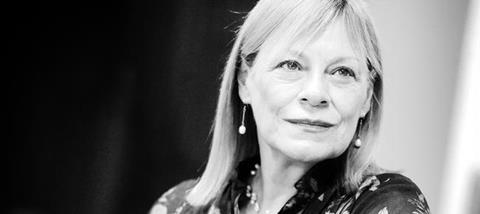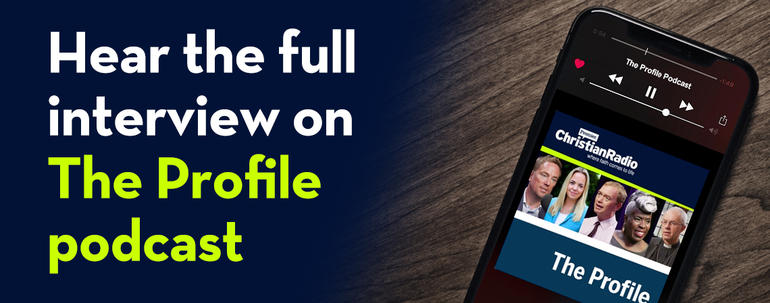In a rare interview, the straight-talking missionary challenges the Church to stop living vicariously through her, and get on with the job

Jackie Pullinger won’t read this. At least that’s what she told me, as we wound up our conversation and I offered to send her a copy of the magazine.
Perhaps I should have been offended at her bluntness, but despite her pouring cold water over the premise of many of my questions, and her body language making it clear throughout our chat that she does not like giving media interviews, my respect for this 74-year-old missionary refuses to dwindle.
Pullinger’s classic autobiography Chasing the Dragon (Hodder & Stoughton) remains a best-seller among evangelicals, despite being released more than 30 years ago. It tells the story of how a plucky young woman from Croydon boarded a ship with nothing but a £10 note and a prayer that God would show her where to get off. When the boat pulled into Hong Kong in 1966, God ordered her to disembark and Pullinger the missionary obeyed.
Kowloon Walled City was a lawless slum full of opium dens, pornographic film theatres and triads who profited from crime and prostitution. It was in this place of darkness that Pullinger’s life (she detests the word ‘ministry’) began. As she got to work, loving the unlovable, God showed up. Heroin users would pray in tongues and find themselves miraculously released from their addiction. Crime bosses surrendered their lives to Jesus. Prostitutes quit.
In one sense, little has changed in the decades that have followed. The Walled City might have been demolished and replaced with a park in the mid-1990s, but Pullinger’s work among Hong Kong’s poorest continues to this day through the organisation she founded, St Stephen’s Society.
I met Pullinger at Refuel (refuelscotland.org.uk), a Christian festival held annually in the grounds of a castle in the Scottish Highlands. Organised by The Filling Station, the event drew hundreds of families from all over the UK to hear from a variety of speakers, including the veteran missionary. The billiards room inside Gordon Castle was an unlikely setting for a conversation with a woman who has spent her life serving the downtrodden. Nevertheless, I wanted to make the most of what I’d naively assumed would be an hour-long conversation. Pullinger had other ideas. After we’d spoken for 30 minutes, she bristled. Our interview was being recorded for radio, so rather than interrupt the recording, she simply raised her right hand and showed me her wristwatch. In case I hadn’t got the message, she twice tapped the clockface and glared at me.
Those who moan that Christians are too soft clearly haven’t spent time with this woman. If you’re going to minister to gang leaders, you need to be tough, and it takes a certain kind of person to get on a ship with nothing but a prayer that God will use them. So rather than being bothered by this evangelist’s severity, I was inspired by her single-minded determination to follow God, even to the ends of the earth.
I had been warned about Pullinger’s serious demeanour beforehand (it’s fair to say her reputation proceeds her). “Formidable” is the most commonly used adjective I’ve heard applied to the missionary. Some have gone much further. One well-known evangelist once referred to her as a “dragon”. It’s not as derogatory a term as it might sound. Surely the Christian Church could do with a few more fire-breathers?
Is there a particular message that’s on your heart for Christians at Refuel?
My message is always the same; it’s how to get us sure enough of God’s love, so we can go out and share it with the lost.
It’s as simple as that?
Well, I don’t know about you, but to me it looks quite simple. Having tasted of his love all I wanted to do was share it until I died.
Did you grow up in a Christian family?
We went to church at Easter and Christmas. So, yes, we all thought we were Christians because we’d been born in England.
When was the moment where you felt like you had a real encounter with God?
Well, I hadn’t actually met people who looked as if they liked God until I was a music student in London. I had met Christians that backed me into a corner and asked me if I was saved, or washed with the blood, or something. I had no idea what they were talking about and I just wanted to disappear. But towards the end of my time at the Royal College, I met some people who invited me to a coffee party and said they held Bible studies.
Some of the talks were very similar to the Alpha talks. I listened to what was going on in those talks because the people actually looked happy. I hadn’t met anybody that looked happy knowing God before then, so that made the difference, I think.
I decided either Jesus was mad or mistaken, or he really was who he said he was: the only way to the Father. So, I said to him: “Well, I don’t like that you say you’re the only way because I’d rather be broad, but I’ll accept that.” And my life really did change.
I’d love to take you back to that time when you were on the boat and asking God where you should get off to become a missionary. Was that an exciting moment, or was there a sense of apprehension as well?
No, excitement. Because that was the way he prepared for me to go, it was not hard. You know, it actually was fun. Mercifully I didn’t know too much about how other Christians operate. So, I had no preconceptions. I just thought this was an adventure and I was going to go wherever God took me and share Jesus along the way. And that’s really the adventure I’m still on.
What were your first impressions of the Walled City?
By the time I got there, all kinds of illegal buildings had gone up because they didn’t need building permission inside. It was like card houses; you built one on top of another, so it was going upwards. And there was no electricity, and there were more rats than people – and there were about 100,000 people – illegal dentists, drug dealers in opium dens and heroin dens where they sold girls, and blue film theatres, gambling dens; all illegal. And then there were the triads, the secret societies, just like Mafia really, who live off crime and prostitution, and protection and frightening people.
Some would assume this would be incredibly scary but the impression I get from you is that because it was where God called you it was an adventure?
The second time I went into the Walled City I just felt this incredible joy and I thought, why am I feeling like this? You know, nobody’s given me flowers or said I look beautiful, it’s not my birthday. But it was that kind of feeling. I found whenever I was in there that’s how I felt. Of course, I was going to find out about the little girls that had been sold, the old women that were guarding them, and the young triads. And the fights and the opium addicts and the misery, but still I really loved the place.
How did you go about learning the language?
Well, it was a good thing it didn’t begin too quickly because I just had time to do a short evangelism course before I got on the ship, and if I’d known Chinese I would have said too much. I thought that preaching the gospel was explaining how Jesus came to die for your sins and, of course, that’s not preaching the gospel at all.
Why isn’t it?
Because that’s not necessarily good news to anyone who doesn’t know love, who doesn’t understand your language, who doesn’t follow your logic. So, it was a good thing because found out that the people there were not listening anyway, they were watching to see how I acted, whether I really did love them. And if I really did love them, maybe God really did love them.
Do you remember your first convert?
Oh yeah, he was somebody who was about to join the triads. His name was Christopher and he met Jesus, but after that he avoided me for quite a long time. And I trapped him some months later by a sewer. I said: “Why have you been avoiding me?” He said: “Well, I came to know Jesus but you gave me a library.” I’d given him all these follow-up books. All the things that, in my culture, I thought would help. And it terrified him because they very much elevate learning in Hong Kong and Chinese culture, and so if you failed at school you couldn’t be a Christian because they think being a Christian is all to do with studying and being good enough. And his worst fears were confirmed.
So, I thought, whoops, it’s the wrong way around. I’d better learn how Jesus would do it.
Is there a lesson there that Western Christians can be too bookish?
I think the word of God is terribly important but it depends how you access that. Nowadays when people come to know Jesus, we pray with them for the gift of tongues immediately. It’s not an optional extra, we say, by the way he’ll give you a new language to help you talk to him. So they do, and several times it has happened that within a few days they’re prophesying. And one man prophesied half of Philippians 2, which he’d never read and couldn’t read anyway, four days after he came to know Christ, and he was still on drugs.
When other people travel to Hong Kong to work with you, is it true that you want them to be able to speak in tongues, and it’s almost a prerequisite…?
No, it’s not a prerequisite. The prerequisite is: “Would you like to help pray somebody off drugs?” OK, now can you manage four hours of praying non-stop? Tongues would be a really great help. That’s it. It’s not the tongues that makes it special, it’s just quite hard to keep going in your own language.
Have you seen people come through from being addicts, to starting their own ministries?
We don’t talk about ministries. I don’t have a ministry either, I just have a life. The joy is not seeing them come through, the joy is knowing Jesus.
Chasing the Dragon continues to be a very popular book. Given that it was published back in 1980, and your work continues, why have you never written anything else?
The only reason I wrote two books was because other people decided to write them for me and I hated them so I thought: goodness, I’d better do that myself!
No, I don’t go on writing books about what God has done through us. I want people to go on writing books about what God does through them. Otherwise it’s vicarious, isn’t it? People are going to get all the thrills through what has happened through me, instead of all the thrills through what God wants to do through them.
I’m still working with lost people. I haven’t got that much time to go off and write a book.
Some people have compared you to Mother Teresa.
I don’t know what to think about that. [Laughs].
One could perhaps see where they are coming from, in that you have both devoted your lives to serving Jesus and serving the poor…
You know, I think everyone’s called to the poor, I really do. Because the poor need help. They need food.
Do you think the British Church is sending out enough missionaries?
My concern is that scripture has told us clearly that we are all to be going, and the reason the Lord left us behind is to do the job he told us to do. So we’d better get equipped to do it, instead of living this life as if this life is it. It’s not, this is a very short life. And eternal life is forever. We’re going to feel stupid for eternity if we wasted this one.
Is it that view of eternity that drives you?
No, I’m not driven. I’m led.
What’s the difference?
Addicts are driven. Satan drives. The Holy Spirit leads. So, I’m not even purpose-driven, hopefully I’m Spirit-led.
How did you meet your husband?
We prayed him off drugs.
...that’s quite the opening gambit!
He grew up in the Walled City with five sisters and a mother who could hardly feed them. Very poor. The first time he came to us – as a drug addict – he came to the meetings in the Walled City and met Jesus. He just so loved it he couldn’t wait to get back. Then he came to live in our house as we prayed him off drugs. Then he got baptised in the sea and his mother got baptised with him and we got to know the whole family and so the years went on.
You were married for seven years before his death in 1999. It must have been nice for you to have a companion in your work which, one would imagine, could feel quite lonely at times?
No, not at all. I quite like being alone, and for most of the time when we’re praying people off drugs it was in my own home so I wasn’t alone. I didn’t marry for companionship, I just married him because I loved him and, you know, it was better to marry him than sin.
Obviously I’d never dare ask a woman her age, but let me put it this way…
I won’t answer truthfully!
…I don’t think anyone would imagine that you’re looking at retirement plans?
Well, I’m not employed so, no!
But you know what I mean; other missionaries might say: “I’ve served my time, I’m done! I’m off to lie on a beach for a bit…”
No. Though I wouldn’t mind lying on a beach for a bit. No, I’ve got no retirement plans and I’ve got no succession plan.
What about St Stephen’s? Will that work stop when you pass away?
I’ve told them, you can do what you like, just as long as it’s what you feel passionate about and the Lord’s told you to do it. You don’t have to carry on my work. So, whether St Stephen’s goes on or not is irrelevant. I think many Christian groups exist long after they ought to have stopped anyway. The group serves a purpose for a season.
Do you ever think about the word ‘legacy’ and what that might mean for you and how you’d be remembered?
Oh, I couldn’t care less. I’ve made wonderful plans for my funeral which, of course, I’m not going to be able to see. My friend is going to knock up a wooden box. All my remains, if there is still any elasticity in them, will be going for medical research so we haven’t got to bother about a grave, which is good. I’ve chosen the songs, which I’m quite interested in.
The legacy? All I care about is that there are some people walking by foot from village to village sharing their bread, praying for the sick, leaving one page of the Bible or a song and walking on to the next village.
Enjoyed that? Get more articles covering news, culture, faith and apologetics in every print issue of Premier Christianity magazine. Subscribe now for HALF PRICE (limited offer)
To hear the full interview listen to Premier Christian Radio at 4pm on Saturday 19 January or download The Profile podcast





































